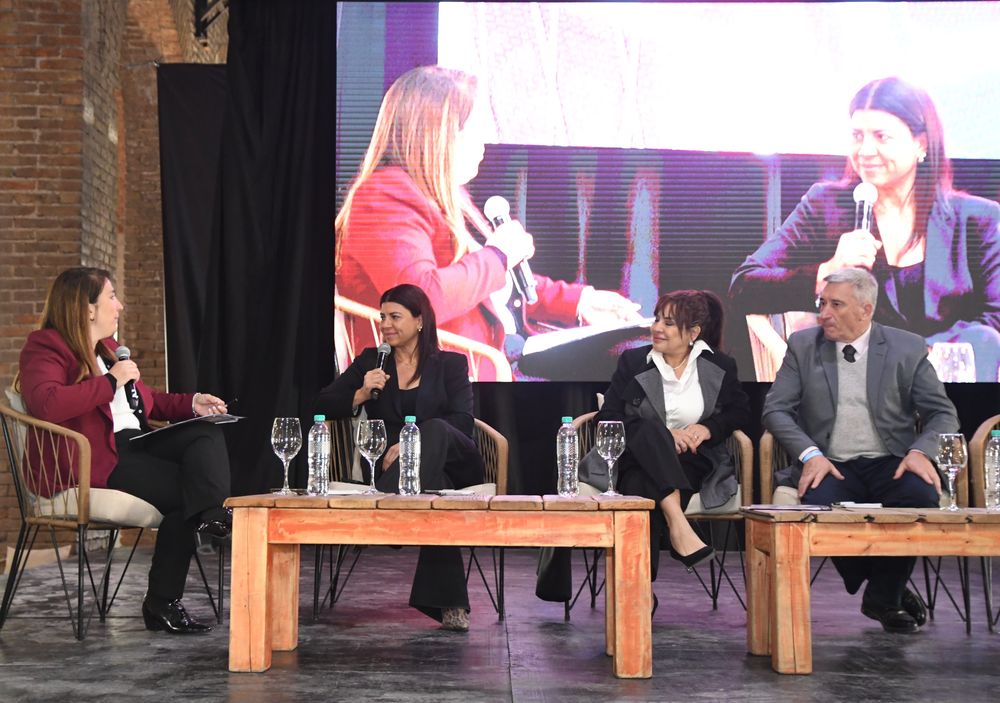Women in Mining Argentina: Education, communication, and sustainability with a gender perspective

During the afternoon presentations, the focus was on success stories related to the cultural changes needed within the industry, including the situation in Mendoza.
The afternoon session of Women in Mining Argentina (WIM) successfully maintained the interest of the event's large number of attendees. "Networked Voices, the Path to Development" concluded a day filled with reflections that highlighted both the challenges and opportunities of mining . With a focus on the gender perspective, the presentations featured studies on the current state of the sector and what the future holds. Success stories, cultural changes, and the importance of education were featured throughout the afternoon.
"We are proud miners," said Karina Viñas, director of the WIM Gender Committee , who opened the event by presenting the Mendoza City Municipality's "Women in Innovation" award. She emphasized that one of WIM's goals is not only the inclusion but also the permanence of women within the mining industry. This is because it is important for this organization to highlight the inconveniences and cultural barriers that still exist for women in mining and similar activities.
"We need sustainable and humanized mining ," Vignas emphasized, adding that WIM's work aims to modify public policies to facilitate more women reaching different positions. This is because in these types of professional areas, women face glass ceilings, sticky floors, and so on every day. Within this framework, Yamila Meljim, Secretary of Economic Development for the Municipality of Mendoza, stated that the innovation award seeks to recognize, recognize, and make visible the women who are transforming science and technology, energy, business, and sustainability. "It's not just about recognition but also about proposing public policies to generate more opportunities for women to reach leadership positions," Meljim said.
Melina Patti, Project Director at the consulting firm Poliarquía, presented the main findings of a survey on "educational and labor challenges and needs in the Argentine mining sector." During the panel on "labor requirements and training programs in Mendoza," it was highlighted that the survey was conducted from a gender perspective. Among other important points, it was shown that in Mendoza, 9 out of 10 respondents believe there will be greater employment opportunities in the province.
Mendoza residents also stood out due to a higher percentage of companies that believe the region has a high capacity in terms of adequate resources, as well as a very good opportunity to meet mining demand. Regarding gender, challenges were highlighted, such as the difficulty in balancing family and work responsibilities, the fact that there are few women in business and union leadership positions, and the lack of adequate infrastructure for women.
Women in Mining 4.jpeg

“In Mendoza, however, the perception of women 's inclusion in strategic or technical positions was greater,” Patti explained. One of the difficulties cited as a barrier to women's access to the sector has to do with the educational offering. Among other things, it is not distributed equitably throughout the country, so not all women have the same opportunities to access it. In this context, Mariela Ramos, Director of Higher Education in Mendoza , explained that she always believed that education was one of the most important areas for changing the myth of mining in Mendoza.
Among other actions, the official highlighted the free, graded courses offered to teachers at all levels, which quickly filled the capacity to approximately 1,200 people. "Not only did it show that there was interest in the subject, but many teachers commented on how it had changed their perspective on mining ," Ramos emphasized. She also noted that the Logistics and Mining training program, which began in Uspallata, had 120 participants, half of whom were women .
Communication and sustainabilityJimena Ponce, line coordinator for the Ministry of Energy of Mendoza, also participated in the teacher training and general education groups. She was part of the strategic communication panel, along with Carolina Frandsen, a political scientist and communications specialist , and Verónica Morano, vice president of WIM Argentina, on the Strategic Communication panel. Among other things, this panel featured public and private success stories in transforming communications to bring mining closer to people in an "honest and ethical" way.
Thus, Ponce highlighted the change in the mining code that allowed everyone in Mendoza public access to information, as well as the creation of the Mining Environmental Police. "We are in a changing era, and mining has many stories to tell that come from within the industry," Frandsen emphasized. From his perspective, strategic communication requires sensitivity and humanity in order to connect and show what is truly experienced within the industry.
Before moving on to Q&A with geologist Marita Ahumada, the panel " Mining and Sustainability" highlighted the growing importance of companies in their environmental policies. This section of the event featured Carla Ortega, Head of Sustainability at the Mendoza Mining Directorate; Sandra Barceló, Opportunity Management consultant; and Leonela Fuentes, founding partner of HASU, a company specializing in Safety, Hygiene, and the Environment.
In this space, there was agreement on the importance of introducing and maintaining good practices within the sector. Similarly, the challenges surrounding this issue were discussed, which was defined as strategic not only due to the need to protect the environment but also because of its key role in business. Sustainability is key to going public, attracting investors, and, above all, to giving life to mining projects that contribute to the economic development of the provinces. To achieve this, not only mining companies must be sustainable, but also each and every supplier in this sector.
- Topics
- Mining
- Women
- Whose Miner
losandes





